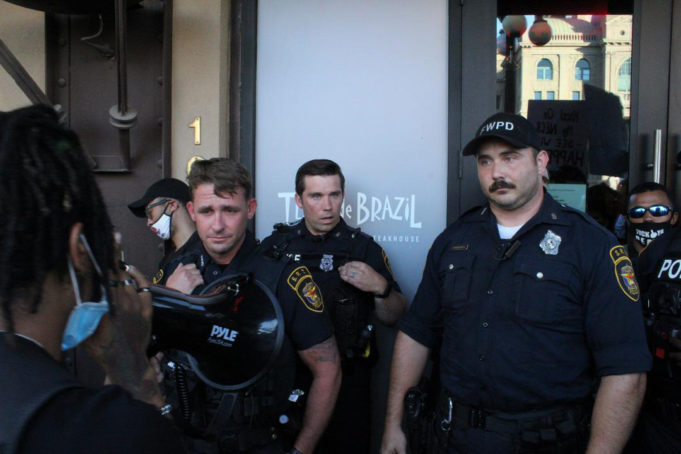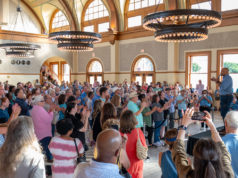Speaking in Fort Worth last week, Gov. Greg Abbott sent a stern warning to state elected officials: Hands off police budgets or else the guv is going to take away your piggy bank. The playground bullying antics, which were broadcast from inside the Fort Worth police department’s Bob Bolen Public Safety Complex Administration, were aimed at supporters of police department defunding — the oft-misunderstood term that calls for the selective reallocation of taxpayer money toward preventing crime and away from practices that too-frequently result in the shooting of unarmed Black men and women, among other grave policing problems.
“Any city in the state of Texas that defunds law enforcement will have their property tax revenue frozen as of that time,” Abbott blustered at the press briefing.
The gubernatorial commination came days after Austin City Council voted to reallocate 34% of city police funds toward social services and to reorganize existing police services.
Austin leadership responded to the political jab by stating that a “group of all-white members of our state government, including Gov. Greg Abbott, attacked the Black Lives Matter movement. The message from the tens of thousands of Austinites who made their voices heard in this year’s budget process was clear: We must decrease our over-reliance on police to handle all of our complex public safety challenges and instead reinvest in domestic violence shelters, mental health first responders, and more.”
Most major Texas cities, including Fort Worth, allocate around one-third of their annual budget to policing. Fort Worth police department’s 2020 budget is $352,893,268, according to the city. Abbott may well have chosen Fort Worth because he felt Cowtown was safely in the tough-on-crime camp following the mid-July public vote to renew Fort Worth police department’s Crime Control and Prevention District (CCPD), which is fueled by a half-cent tax and raises around $81 million per year for police use.
If Abbott chose Fort Worth because he felt it was a badge-worshiping city, he should do some research. Since he’s a busy man, we’ll do it for him. The CCPD tax district passed with 64% of voter approval — considerably down from the 84.6% of voters who approved the last CCPD extension in 2014. For the first time in recent memory, city budget discussions are garnering thousands of online views, and locals are far less likely to confuse the 287 agreement that our county has with ICE with the U.S. route that bears the same name. Mansfield is not in cahoots with ICE … as far as we know.
Or maybe Abbott had a simpler reason for showboating in Cowtown: money. The governor has local political allies with private jet-levels of ka-ching who have donated heavily to his campaign in the past. In late 2013, when running for reelection against former Fort Worth City Councilmember Wendy Davis, Abbott took in $60,000 from the misleadingly named Good Government Fund of Fort Worth (run by the Bass family), $50,000 from locally based Suerte PAC, and $25,000 from local investment banker Geoffrey Rayor, according to public records.
Financial campaign records show that the Good Government Fund of Fort Worth and another Bass-backed PAC, PSEL, donated $10,000 together to Sheriff Bill Waybourn in 2016, $5,000 to Tarrant County District Attorney Sharen Wilson in 2017, and $2,500 to Mayor Betsy Price last February.
According to the nonpartisan nonprofit National Institute on Money in State Politics, the Good Government Fund has disbursed $3,333,213 over 24 years, including just over $300,000 to Democrats.
Read the campaign contributions of prominent local Republican politicians, and you could be forgiven for thinking it was a membership directory for the Colonial Country Club — the exclusive club for Fort Worth’s wealthy that was somehow awarded $1 to $2 million in federal loans as part of the Payroll Protection Program (PPP) last April. New golf carts, anyone?
Fort Worth’s pro-business left isn’t without fundraising prowess. Former Mayor Mike Moncrief, a Democrat, pulled in a sizable $185,997 in campaign contributions in 2009, the year he was reelected, and he used his position to pander to oil and gas companies at the expense of public health and common sense.
But Fort Worth’s elites have a vested interest in supporting conservative, rule-of-law candidates and opposing police reforms, and it has little to do with abortions and welfare and everything to do with protecting property and the ability of the wealthy to continue funneling money from the rest of us. One elected official recently put it plainly.
“As we look around at the wealth and success of this great county, there are two fundamental reasons for this,” Waybourn told a crowd of several hundred at last month’s The March for America rally. “We were blessed by an almighty God. It is the rule of law that makes [this country] flourish and wealthy.”
As with much of Texas’ uber-rich, Fort Worth’s blue bloods made their early fortunes as landowners and cattle ranchers. When oil became a lucrative commodity, owning property paid dividends.
Today, the real money is in development, as evidenced by the tightknit relationship between surnames and properties: the Stockyards (Hickman, Murrin), downtown (Bass), and the Shops at Clearfork (Edwards). Not all of Fort Worth’s top-tier earners garner the same political clout. You can learn a lot about a city’s vested interests by its policing habits.
Last June, hundreds of reform-minded protesters began daily marches from downtown to the West 7th corridor, where the marchers berated Varsity Tavern (for allegedly using discriminatory policies that kept Black customers out) and Your Mom’s House (for allowing one staff member to dress in Blackface) by using megaphones, chants, and other nonviolent means of disrupting business.
Fort Worth police kept a watchful but distant eye on the rowdy crowds. On June 12, protest organizers tried a new tack. After a week of flooding West 7th restaurants and bars with raucous marchers, a small group aligned with protest group Enough Is Enough pressed into Texas de Brazil, which is located one block from the Bass-owned downtown district of Sundance Square. Around one dozen police officers immediately followed suit and, shortly after, ordered the protesters out. Protesters said they wanted to go where “Betsy Price eats.” During protests the next day, police filled downtown restaurants to prevent the types of disruptions that the same police had allowed in the West 7th corridor.
Two days into the downtown disruptions, two protest organizers were arrested on what appeared to many as bogus charges of interfering with public duties and giving false or fictitious information to a peace officer. The message was clear. Protesters would not be allowed to disrupt businesses near Ed Bass’ hood.
Men and women pursue careers in law enforcement for many often honorable reasons, and protecting buildings and capital probably isn’t one of them. Disentangling policing habits from corporate interests requires independent oversight of CCPD spending, a counterbalance to the heavy campaign contributions of the Fort Worth Police Officers Association, and a willingness to have honest discussions about the influence the wealthy maintain in local campaigns.
As long as investment bankers and development moguls are buying our sheriff, mayor, and DA, the only seat at the table they’re going to save for the non-rich is at Texas de Brazil.













The biggest thing I don’t understand is why FW Weekly and others believe that a wealthy person is “funneling money from the rest of us”. I cannot identify how has any super-wealthy person has taken any money from me. The US dollar is not a finite number. Money is generated by the creation of new businesses, and money is the needed incentive for individuals to be encouraged to start those new businesses. My income comes from being an employee at a corporate business, and the bigger their business gets – the more money in their pockets and more jobs created for money in other people’s pockets, including mine. It seems to me that our government and law enforcement should protect businesses because that protects everyone’s livelihoods.
The wealthy (and their businesses) seem very adept at avoiding paying taxes and securing federal bailouts. This type of “socialism for the rich” is funneling money away from the rest of us. They rely on people not noticing every election cycle…
So wait, the FW Weekly is upset because police did not allow protesters to disrupt and damage property in places of business? Oh, and because the CCPD passed with 54% of the vote instead of the previous 80 plus percent? Isn’t that how a democracy works?
Melanie, I’m 63. I grew up in a middle-class country that no longer exists. Infrastructure and schools were well-funded back in the day. Fast-forward to our time when our teachers have to pay for so many of their supplies out of their pockets, and our infrastructure is given a D by engineers. What happened? The effective tax rate for the richest is about half what it was when I was growing up. The rich have used their money and power to effectively funnel money from the rest of us to themselves. Thus increasing their wealth and power. Joseph Stigltz, a Nobel prize winning economist, explains it better than I ever could. Check him out.
Whine, Whine, Whine. the author seems to be very upset that Fort Worth didn’t get to have the looting, destruction and disruption of business that other big cities were blessed with. so sad, maybe during the second Trump term.
The article attempts to walk back the “defund” cause by redefining the word. See, the prefix “de-” means “to remove.” If you say you’re going to declaw your cat, it means you’re going to have its claws removed. The Left should have done some poll testing before they unveiled “defund.” They learned too late that it’s a losing issue, so now they’re playing redefinition games.
Barring other possible underlying appendages, money is the glaring factor in Abbott’s case; other motivations might become known if enough stones are turned. I kind of get the kick back in some comments saying how this is taking on a veneer of clamping down on big businesses out there, but this is actually misleading. One can only take one step at a time, there’s no point in throwing in face-vase shenanigan into this.